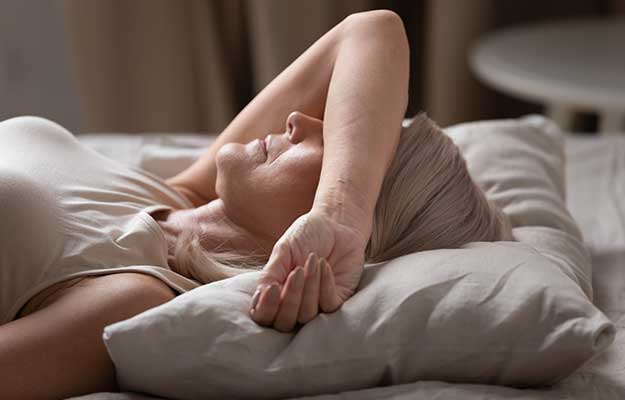Anxiety may strike at any point in a woman’s life. However, it appears to be more prevalent throughout hormonal changes such as adolescence, pregnancy, perimenopause, and finally, menopause. As a result, many women seek to investigate the relationship between menopause and anxiety to see if they are related and impact their mental health.
RELATED: Yoga for Anxiety: 5 Tips and Positions
Menopause and Anxiety: What’s the Relationship?
Menopause is the time of life when a woman stops having periods and can’t get pregnant naturally anymore. It is a natural part of aging between 45 and 55, as estrogen levels fall. Anxiety symptoms are more common in women through menopause than in other stages. Some women may experience anxiety due to physical changes, such as a deteriorating body image or the loss of fertility.
Sleeplessness or frequent waking during the night, lack of energy, trouble focusing, irritability, and even depression are all part of this period. While these are the hormonal change symptoms due to menopause, they can exacerbate anxiety and make it challenging to manage adequately. Let’s find out the link between menopause and anxiety.
Hormonal Changes
Women’s vulnerability to anxiety and mood swings may be attributed to their estrogen levels since there is a connection between hormonal changes and mental conditions. Women undergoing hormonal changes are more likely to suffer mental disorders, leading to debilitated mental well-being.
According to research, low estrogen levels can make women more sensitive to trauma. Findings also suggest that when estrogen levels are low, women are more likely to have symptoms of post-traumatic stress disorder (PTSD). In contrast, high levels of the female sex hormone can partially protect them from emotional distress.
Sleep Problems

Once menopause passes and the hormone levels are balanced, many women find that their level of anxiety decreases. However, in addition to hormonal changes, many other factors have a role in developing anxiety during menopause, one of which is sleep problems.
According to research, menopausal estrogen decline contributes to disrupted sleep and frequent awakening by triggering menopausal symptoms, including hot flashes and sweating. Menopausal sleep problems, on the other hand, can be the cause of anxiety and depression. If you have sleeping problems and anxiety, try to develop a good bedtime routine, such as taking a warm bath or doing some light reading before bed.
Concerns About Body Image
In general, our thoughts and feelings can influence our well-being throughout our lives. What we think and feel about our bodies is referred to as body image. Psychologically, body image plays a substantial role in anxiety due to the fear of being judged based on one’s appearance.
Having body image concerns is a common experience that might lead to a risk factor for mental health problems. Research has found that higher levels of body dissatisfaction have been linked to a lower quality of life, psychological discomfort, and an increased incidence of unhealthy eating habits.
If you are suffering from body image concerns, you need to build a positive body image and sustain good mental health. You can also choose to accept your body’s natural changes as an inevitable part of aging.
RELATED: Menopause Weight Gain: What It Is and How to Combat It
Worries About Infertility
Although it is sadly inevitable for every woman, menopause means you can’t have a baby anymore. This infertility due to menopause might be the cause of anxiety among women. According to research, women with infertility suffer higher levels of anxiety and depression. The inability to reproduce naturally might make women feel like they’ve lost something important in life.
A survey on the relationship between anxiety, depression, and duration of infertility has shown that anxiety was most common after 4-6 years of infertility. Furthermore, those with infertility for 7-9 years could suffer from severe depression.
Now you know the relationship between menopause and anxiety. Remember that it is essential to identify the cause of anxiety you’re suffering to find the best ways to resolve them. Practical things that can help reduce your anxiety during menopause include following a healthy diet and regular physical activity.
Yunique Medical provides FUNCTIONAL MEDICINE for optimized health and performance. We offer customized, scientifically advanced treatments to create a new state of human thriving. Why be ordinary when you can be optimal?
HUMAN 2.0 begins here!
Contact us to schedule your FREE consultation at one of our three locations in Florida – Ocala, Fruitland Park (The Villages), and Daytona.
UP NEXT:

